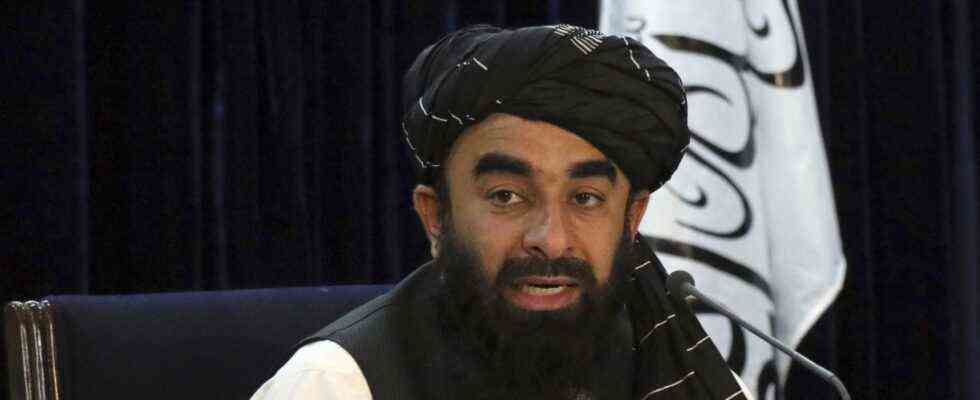Status: 08.09.2021 8:51 a.m.
The Taliban have set up an interim government – with senior members in leading positions. The US expressed concern that central demands of the West had not been implemented.
The radical Islamic Taliban in Afghanistan have set up a transitional government – but the filling of political posts is a cause for concern in the United States.
A US State Department spokesman said his country’s government was concerned about the “connections and history” of some of the Taliban’s appointed ministers. The US would continue to expect “the Taliban to ensure that Afghan soil is not used to threaten other countries and that access to support the Afghan people continues”.
The Reuters news agency quoted Jen Psaki, spokeswoman for the US government, who stressed that the US would not recognize the Islamists’ interim government in the short term.
Meeting of Foreign Ministers Blinken and Maas
Foreign Minister Antony Blinken is traveling to the Ramstein US base in Rhineland-Palatinate today. During the US evacuation mission in Afghanistan, the airbase served as a hub through which people who had flown from Kabul first came to Germany, from where they were brought to the USA.
During his visit, Blinken will also meet with Federal Foreign Minister Heiko Maas to discuss the situation in Afghanistan. As ARD correspondent Silke Diettrich reports, further foreign ministers from other countries are to take part in the deliberations at a video conference following the visit.
Blinken had previously traveled to Qatar. According to him, more than 58,000 Afghans and citizens of other countries have been flown into the country. The foreign minister stressed that the US wanted to continue negotiating with the Taliban about evacuations from Afghanistan. The aim is that further charter flights can safely leave the country. The Taliban have promised to let all those who have travel documents leave Afghanistan. “The international community is watching closely to see if the Taliban keep their promises,” said Blinken.
Senior Taliban leaders in top positions
The interim government appointed by the Taliban is headed by Mullah Mohammed Hassan Achund, said Taliban spokesman Sabihullah Mujahid. Achund was already at the side of the late Taliban leader Mullah Mohammed Omar and had led the Taliban government in Kabul, which was in power until 2001, for years. Most recently he was part of the leadership council of the Islamists, the Rahbari Shura, and is considered a close confidante of the Taliban leader Haibatullah Achundsada.
His deputy should therefore be Mullah Abdul Ghani Baradar, the previous deputy head of the Taliban. The second deputy is Maulawi Abdul Salam Hanafi, who most recently worked in the Taliban’s political office in Doha.
In this role, Baradar had negotiated with the previous US administration under President Donald Trump. The result was the so-called Doha Agreement, which was signed at the end of February. In the agreement, the Taliban undertook to negotiate peace with the now disempowered Afghan government, cut ties to terrorist organizations and, as far as possible, refrain from violence. In return, Trump had promised the Taliban the withdrawal of troops from Afghanistan.
Mullah Abdul Ghani Baradar becomes deputy head of the interim government.
Image: AFP
US Secretary of the Interior classified as a terrorist
The Taliban appoint Sarajuddin Haqqani as interior minister. Above all, this personality is likely to meet with criticism in the USA. Haqqani is the founder of the so-called Haqqani network, a terrorist group believed to be responsible for numerous large attacks in Afghanistan. Also for an explosion in front of the German embassy in Kabul in 2017, in which more than 150 people were killed. Haqqani is on terrorist wanted lists and one of the FBI’s most wanted men. The post of defense minister will also be filled – by Mullah Mohammed Jakub, the son of the Taliban founder Mullah Mohammed Omar.
No change recognizable
Even ARD correspondent Markus Spieker According to the transitional government, the change that the Taliban themselves had promised is missing. He describes Achund as a “religious hardliner”, partly responsible for the demolition of one and a half millennium old Buddha statues in Afghanistan in 2001.
His deputy is somewhat more moderate, but the cabinet posts that have been created reflect the Taliban’s previous radical line – for example in the “Ministry for the Promotion of Virtue and for the Prevention of Vice” – from Spieker’s point of view nothing more than a kind of “religious police”.
Markus Spieker, MDR currently Kabul, on the Taliban interim government staff in Afghanistan
daily topics 10:00 p.m., 7.9.2021
The Taliban had promised an inclusive government
The Taliban’s interim government is also encountering criticism and sarcasm on social media. “Congratulations to the world community,” wrote a journalist on Twitter. “The Taliban have re-established their Islamic Emirate. Great job you’ve done there over the years.”
Half of the people in Afghanistan are not represented in this government, others wrote. Because there is no woman in the new cabinet. However, this is not surprising, as the Taliban had never announced that women could also rule in their emirate.
However, they had promised to form an inclusive government – that is, with men from other parts of the country and with different ethnic backgrounds. That is currently not the case; the appointed ministers are all from the ranks of the Taliban.
The cabinet is not yet complete, said Taliban spokesman Sabiullah Mujahid. The Taliban occupied a total of 33 posts in their transitional government. More should be announced “after long deliberation”, according to Mujahid. How long the transitional government should remain in office, the Taliban left open. In addition, they did not indicate that further positions should be filled by people who do not belong to the Taliban.
New Islamic emirate in Afghanistan
Silke Diettrich, ARD New Delhi, 9/8/2021 8:07 am

